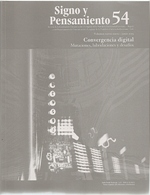Abstract
The digital environment has revived a debate that goes back centuries, relating to the desirability of a type of knowledge which is subject to private appropriation versus knowledge of free and open access. The relevant reflections on the topic of intellectual property have been construed from changes in technology vis-à-vis information. Information and communication technologies (it) have generated cultural changes associated with the construction of a network society. This article analyzes some points relevant to the problem of copyrights which are confronted by the access to culture and information, the risks faced by the right holders, and some implications on the road to a “learning and knowledge society”.
Beck, U. (2006), La sociedad del riesgo. Hacia una nueva modernidad, Barcelona, Paidós.
Berners-Lee, T. (2007), “Testimony of Sir Timothy Berners-Lee Before the United States House of Representatives Committee on Energy and Commerce Subcommittee on Telecommunications and the Internet Hearing”, en: Digital Future of the United States: Part I. The Future of the World Wide Web, Nueva York.
Burke, P. y Briggs, A. (2002), De Gutenberg a Internet. Una historia social de los medios de comunicación, traducción de Marco Aurelio Galmarini, Barcelona, Taurus.
Castells, M. (2004), “Informacionalismo y la sociedad red” [epílogo], en Himanen, P., La ética de hacker y el espíritu de la era de la información. Barcelona, Destino Libro.
— (2006), La teoría de la sociedad red. La sociedad red: una visión global, traducción de Francisco Muñoz de Bustillo, Madrid, Alianza Editorial.
Chapman, A. R. (2001, julio-septiembre), “La propiedad intelectual como derecho humano: obligaciones dimanantes del apartado (c) del párrafo 1 del artículo 15 del Pacto Internacional de Derechos Económicos, Sociales y Culturales”, en Boletín de Derecho de Autor, vol. XXV, núm. 3, UNESCO.
Chartier, R. (2003), Estudio preliminar. Carta sobre el comercio de libros de Denis Diderot, traducción de Alejandro García Schnetzer, Buenos Aires, Fondo de Cultura Económica.
Cordón García, J. A. (1997), El registro de la memoria: las bibliografías nacionales y el depósito legal, Gijón, Ediciones Trea.
Gantz, J. F. (dir.) (2007), The Expanding Digital Universe, A forecast of Worldwide Information Growth Through 2010, s.l., idc.
Ghidini, G. (2002), Aspectos actuales del derecho industrial. Propiedad intelectual y competencia, traducción al español de José Miguel Embid Irujo, Granada, Comares.
Hernández Sánchez, D. (2008), “Hackers, hacktivistas, artivistas y otras especies fronterizas”, en: Pensamiento herido, filosofías, ficciones e insistemas de sonidoEspaña-Colombia, Bogotá, Pontificia Universidad Javeriana, Embajada de España en Colombia.
Hesse, C. (1998), Los libros en el tiempo, el futuro del libro, ¿esto matará eso?, traducción de Irene Nuñez Aréchaga, Barcelona, Paidós.
Himanen, P. (2004), La ética del hacker y el espíritu de la era de la información, prólogo de Linus Torvalds, epílogo de Manuel Castells, Barcelona, Destino Libro.
Hobsbawn, E. J. (1983), El sentido del pasado. Marxismo e historia social, Puebla, Universidad Autónoma de Puebla, Instituto de Ciencias.
Hoeren, T. (2003), Copyright Dilemma: Acces Right as a Postmodern Symbol of Copyright Deconstruction? Digital Rights Management, Technological, Economic, Legal and Political Aspects, Berlín, Springer-Verlag.
Ibáñez, J. (2005), El control de Internet, poder y autoridad en los mercados electrónicos, Madrid, Catarata.
Lessig, L. (2001), El código y otras leyes del ciberespacio, traducción de Ernesto Alberola, Madrid, Taurus.
Luo, L. (2006), Legal Protection of Technological Measures in China, EIRP.
Nietzsche, F. (2001), Sobre verdad y mentira en sentido extramoral, Valencia, Diálogo.
OECD, Directorate for Science, Technology and Industry, Committee for Information, Computer and Communications Policy (2007), Participative Web: User Created Content [Internet], disponible en http://http://www.oecd.org/dataoecd/57/14/38393115.pdf.
Plaza Penadés, J. (2002), Propiedad intelectual y sociedad de la información, Navarra, Aranzadi.
Pozzo, R. (2005), L’Autore E I Suoi Diritti, Scritti Pelomici Sulla Propietà Intellettuale, Milán, Biblioteca di via Senato Edizioni.
Rengifo García, E. (1993), “El derecho de autor y las nuevas tecnologías”, en: Homenaje a Fernando Hinestrosa, 30 años de Rectorado Universidad Externado de Colombia, tomo III, Bogotá, Estudios de Derecho Comercial, Universidad Externado de Colombia.
Rosenblatt, B.; Trippe, B., y Mooney, S. (2002), Digital Rights Management Business and Technology, Nueva York, M&T Books.
Wherry, T. L. (2002), The Librarian´s Guide to Intellectual Property in the Digital Age, Chicago, American Library Association.
Williams, R. (2006), La sociedad red desde una perspectiva histórica. La sociedad red: una visión global, traducción de Francisco Muñoz de Bustillo, Madrid, Alianza Editorial.
Zhang, Y. y Sabu, E. (2006), A Novel Framework for Multiple Creatorship Protection of Digital Movies, Nueva York, Springer Berlin/Heidelberg.
This journal is registered under a Creative Commons Attribution 4.0 International Public License. Thus, this work may be reproduced, distributed, and publicly shared in digital format, as long as the names of the authors and Pontificia Universidad Javeriana are acknowledged. Others are allowed to quote, adapt, transform, auto-archive, republish, and create based on this material, for any purpose (even commercial ones), provided the authorship is duly acknowledged, a link to the original work is provided, and it is specified if changes have been made. Pontificia Universidad Javeriana does not hold the rights of published works and the authors are solely responsible for the contents of their works; they keep the moral, intellectual, privacy, and publicity rights.
Approving the intervention of the work (review, copy-editing, translation, layout) and the following outreach, are granted through an use license and not through an assignment of rights. This means the journal and Pontificia Universidad Javeriana cannot be held responsible for any ethical malpractice by the authors. As a consequence of the protection granted by the use license, the journal is not required to publish recantations or modify information already published, unless the errata stems from the editorial management process. Publishing contents in this journal does not generate royalties for contributors.


